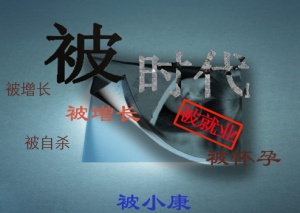“Passive era”的版本间的差异
来自China Digital Space
小 (moved Era of passive tense to Era of passive the tense) |
|||
| 第3行: | 第3行: | ||
[[File:Eraofpassivetense.jpg|300px|thumb|left|''In this era, people are (clockwise from red characters in box) “made to be employed,” “made pregnant,” “made to have a comfortable life,” “suicided,” and “made to increase.”'']] A time when euphemistic labels are given to actions that belie the underlying compulsion behind those actions--that is, the present. | [[File:Eraofpassivetense.jpg|300px|thumb|left|''In this era, people are (clockwise from red characters in box) “made to be employed,” “made pregnant,” “made to have a comfortable life,” “suicided,” and “made to increase.”'']] A time when euphemistic labels are given to actions that belie the underlying compulsion behind those actions--that is, the present. | ||
| − | In Chinese, the grammatical construction | + | In Chinese, the grammatical construction bèi-X means “to be X-ed,” and implies that that the X-ed party has been forced or suffered to X. For example, someone invited to [[drink tea]] (i.e. called in by the police for interrogation) could say she “was tea-drinked” (被喝茶 bèi hé chá). Netizens have coined a [http://chinadigitaltimes.net/space/Be_represented,_be_suicided,_be_increased,_be_GFWed,_be_XXed number of terms] using this construction, giving rise to the “era of the passive tense.” |
[[Category: Grass-Mud Horse Lexicon]] | [[Category: Grass-Mud Horse Lexicon]] | ||
2013年1月18日 (五) 19:38的版本
被时代 (bèi shídài): era of passive the tense
A time when euphemistic labels are given to actions that belie the underlying compulsion behind those actions--that is, the present.
In Chinese, the grammatical construction bèi-X means “to be X-ed,” and implies that that the X-ed party has been forced or suffered to X. For example, someone invited to drink tea (i.e. called in by the police for interrogation) could say she “was tea-drinked” (被喝茶 bèi hé chá). Netizens have coined a number of terms using this construction, giving rise to the “era of the passive tense.”





